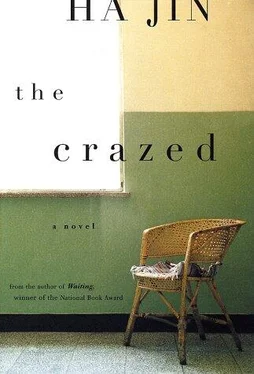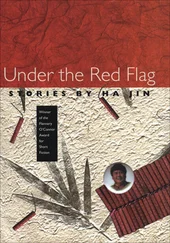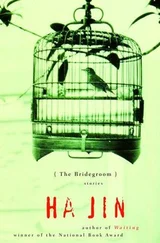Everybody was surprised when Professor Yang suffered a stroke in the spring of 1989. He had always been in good health, and his colleagues used to envy his energy and productiveness — he had published more than any of them and had been a mainstay of the Literature Department, directing its M.A. program, editing a biannual journal, and teaching a full load. Now even the undergraduates were talking about his collapse, and some of them would have gone to the hospital if Secretary Peng had not announced that Mr. Yang, under intensive care, was in no condition to see visitors.
His stroke unsettled me, because I was engaged to his daughter, Meimei, and under his guidance I had been studying for the Ph.D. entrance exams for the classical literature program at Beijing University. I hoped to enroll there so that I could join my fiancée in the capital, where we planned to build our nest. Mr. Yang’s hospitalization disrupted my work, and for a whole week I hadn’t sat down to my books, having to go see him every day. I was anxious — without thorough preparation I couldn’t possibly do well in the exams.
Just now, Ying Peng, the Party secretary of our department, had called me to her office. On her desk an electric fan was whirring back and forth to blow out the odor of dichlorvos sprayed in the room to kill fleas. Her gray bangs were fluttering as she described to me my job, which was to attend my teacher in the afternoons from now on. Besides me, my fellow graduate student Banping Fang would look after Mr. Yang too; he was to take care of the mornings.
“Well, Jian Wan,” Ying Peng said to me with a tight smile, “you’re the only family Professor Yang has here. It’s time for you to help him. The hospital can’t provide him with nursing care during the day, so we have to send some people there.” She lifted her tall teacup and took a gulp. Like a man, she drank black tea and smoked cheap cigarettes.
“Do you think he’ll stay in the hospital for long?” I asked her.
“I’ve no idea.”
“How long should I look after him?”
“Till we find somebody to replace you.”
By “somebody” she meant a person the department might hire as a nurse’s aide. Although annoyed by the way she assigned me the job, I said nothing. To some extent I was glad for the assignment, without which I would in any case go to the hospital every day.
After lunch, when my two roommates, Mantao and Huran, were napping, I went to the bicycle shed located between two long dormitory houses. Unlike the female students, who had recently all moved into the new dorm building inside the university, most of the male students still lived in the one-story houses near the front entrance to the campus. I pulled out my Phoenix bicycle and set off for Central Hospital.
The hospital was in downtown Shanning, and it took me more than twenty minutes to get there. Though it wasn’t summer yet, the air was sweltering, filled with the smell of burning fat and stewed radish. On the balconies of the apartment buildings along the street, lines of laundry were flapping languidly — sheets, blouses, pajamas, towels, tank tops, sweat suits. As I passed by a construction site, a loudspeaker mounted on a telephone pole was broadcasting a soccer game; the commentator sounded sleepy despite the intermittent surges of shouts from the fans. All the workers at the site were resting inside the building caged by bamboo scaffolding. The skeletonlike cranes and the drumlike mixers were motionless. Three shovels stood on a huge pile of sand, beyond which a large yellow board displayed the giant words in red paint: AIM HIGH, GO ALL OUT. I felt the back of my shirt dampen with sweat.
Mrs. Yang had gone to Tibet on a veterinary team for a year. Our department had written to her about her husband’s stroke, but she wouldn’t be able to come home immediately. Tibet was too far away. She’d have to switch buses and trains constantly — it would take her more than a week to return. In my letter to my fiancée, Meimei, who was in Beijing cramming for the exams for a medical graduate program, I described her father’s condition and assured her that I would take good care of him and that she mustn’t be worried too much. I told her not to rush back since there was no magic cure for a stroke.
To be honest, I felt obligated to attend my teacher. Even without my engagement to his daughter, I’d have done it willingly, just out of gratitude and respect. For almost two years he had taught me individually, discussing classical poetry and poetics with me almost every Saturday afternoon, selecting books for me to read, directing my master’s thesis, and correcting my papers for publication. He was the best teacher I’d ever had, knowledgeable about the field of poetics and devoted to his students. Some of my fellow graduate students felt uncomfortable having him as their adviser. “He’s too demanding,” they would say. But I enjoyed working with him. I didn’t even mind some of them calling me Mr. Yang, Jr.; in a way, I was his disciple.
Mr. Yang was sleeping as I stepped into the sickroom. He was shorn of the IV apparatus affixed to him in intensive care. The room was a makeshift place, quite large for one bed, but dusky and rather damp. Its square window looked south onto a mountain of anthracite in the backyard of the hospital. Beyond the coal pile, a pair of concrete smokestacks spewed whitish fumes and a few aspen crowns swayed indolently. The backyard suggested a factory — more exactly, a power plant; even the air here looked grayish. By contrast, the front yard resembled a garden or a park, planted with holly bushes, drooping willows, sycamores, and flowers, including roses, azaleas, geraniums, and fringed irises. There was even an oval pond, built of bricks and rocks, abounding in fantailed goldfish. White-robed doctors and nurses strolled through the flowers and trees as if they had nothing urgent to do.
Shabby as Mr. Yang’s room was, having it was a rare privilege; few patients could have a sickroom solely to themselves. If my father, who was a carpenter on a tree farm in the Northeast, had a stroke, he would be lucky if they gave him a bed in a room shared by a dozen people. Actually Mr. Yang had lain unconscious in a place like that for three days before he was moved here. With infinite pull, Secretary Peng had succeeded in convincing the hospital officials that Mr. Yang was an eminent scholar (though he wasn’t a full professor yet) whom our country planned to protect as a national treasure, so they ought to give him a private room.
Mr. Yang stirred a little and opened his mouth, which had become flabby since the stroke. He looked a few years older than the previous month; a network of wrinkles had grown into his face. His gray hair was unkempt and a bit shiny, revealing his whitish scalp. Eyes shut, he went on licking his upper lip and murmured something I couldn’t quite hear.
Sitting on a large wicker chair close to the door, I was about to take out a book from my shoulder bag when Mr. Yang opened his eyes and looked around vacantly. I followed his gaze and noticed that the wallpaper had almost lost its original pink. His eyes, cloudy with a web of reddish veins, moved toward the center of the low ceiling, stopped for a moment at the lightbulb held by a frayed wire, then fell on the stack of Japanese vocabulary cards on my lap.
“Help me sit up, Jian,” he said softly.
I went over, lifted his shoulders, and put behind him two pillows stuffed with fluffy cotton so that he could sit comfortably. “Do you feel better today?” I asked.
“No, I don’t.” He kept his head low, a tuft of hair standing up on his crown while a muscle in his right cheek twitched.
Читать дальше

![Lao Zi - Dao De Jing [Tao Te Ching] (english)](/books/3890/lao-zi-dao-de-jing-tao-te-ching-english-thumb.webp)
![Lao Zi - Dao De Jing [Tao Te Ching] (chinese)](/books/3891/lao-zi-dao-de-jing-tao-te-ching-chinese-thumb.webp)
![Lao Zi - Dao De Jing [Tao Te Ching] (espanol)](/books/3892/lao-zi-dao-de-jing-tao-te-ching-espanol-thumb.webp)







